- ABOUT
- ARGUMENTS – EXISTENCE OF GOD
- The Argument from Contingency
- Cosmological Argument
- Moral Argument
- Ontological Argument
- Teleological/Design/Fine-tuning Argument
- Pascal’s Wager
- The Argument from Religious Experience
- The Argument from Miracles
- The Argument from Consciousness
- The Argument from Truth
- The Argument from Desire
- The Argument from Aesthetic Experience
- HISTORICITY – RESURRECTION
- CHRISTIANITY & ISLAM
- APOLOGETICS
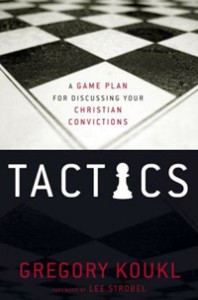 I wanted to recommend to all my fellow apologists, as well as those who are aspiring to be an apologist, the Stand to Reason Christian apologetics site. This site is rich in resources, not the least of which is Greg Koukl’s milestone apologetics book, Tactics. I recommend this book to every Christian, apologist aspiring or not, as it will help to equip you as a witness for Christ, give you more boldness in your daily conversations with friends, colleagues, fellow-students, neighbors, etc., and thereby help build a bridge that others can walk across into the Kingdom of God.
I wanted to recommend to all my fellow apologists, as well as those who are aspiring to be an apologist, the Stand to Reason Christian apologetics site. This site is rich in resources, not the least of which is Greg Koukl’s milestone apologetics book, Tactics. I recommend this book to every Christian, apologist aspiring or not, as it will help to equip you as a witness for Christ, give you more boldness in your daily conversations with friends, colleagues, fellow-students, neighbors, etc., and thereby help build a bridge that others can walk across into the Kingdom of God.
Another resource available on the site is Greg Koukl and Alan Shlemon’s, Ambassador series. Within this series are the Ambassador’s Guide to Pluralism; Ambassador’s Guide to Islam; Ambassador’s Guide to Postmodernism; Ambassador’s Guide to the New Atheists; Ambassador’s Guide to Understanding Homosexuality, and more.
series are the Ambassador’s Guide to Pluralism; Ambassador’s Guide to Islam; Ambassador’s Guide to Postmodernism; Ambassador’s Guide to the New Atheists; Ambassador’s Guide to Understanding Homosexuality, and more.
All these resources and more are available at the Stand to Reason site store which can be found here
For more apologetic resources, please see the resource section on this site here
In the late 1960s, Os Guinness worked alongside Francis Schaeffer at L’Abri, Schaeffer’s famed Christian retreat center in Switzerland. In the 1980s, he moved to the United States, where he served (among other places) at the Woodrow Wilson Center and the Brookings Institution. He has been heavily involved in discussions about the First Amendment and the need for a vigorous, civil public square. Yet he never lost Schaeffer’s vision for Christian apologetics and evangelism, a fact reflected in his latest book, Fool’s Talk: Recovering the Art of Christian Persuasion (InterVarsity Press). CT senior writer Tim Stafford spoke with Guinness about making the gospel appealing in a secularizing culture.
What made you decide to write about apologetics at this time?
Clearly we’re at a stage in Western history where we need the church to be persuasive. Public life has grown more secular. Private worlds have become more diverse, and we have a mounting hostility against us. If ever Christians at large and evangelicals in particular needed to be persuasive with people who are not open, it’s now. So I thought it was the time to write.
Fool’s Talk is the fruit of many decades of thinking. I owe a huge debt to C. S. Lewis, from whom I came to faith; to Francis Schaeffer, who introduced me to the discipline of apologetics; and to Peter Berger, the sociologist, who has probably shaped my mind more than any other living person. My approach is a mixture of the three of them.
At the beginning of your book you refer to this as “the grand age of apologetics.” That will surprise some people. What do you mean by it?
The phrase is not mine. I read it in a sociology article, and it surprised me at first. In the age of the Internet, everyone is presenting their daily me. Think of Facebook. People are selling themselves, defending themselves, presenting themselves, arguing for themselves, whatever. In that sense this is the age of apologetics. When I read that, I realized that we Christians have had this in our DNA for 2,000 years. But are we prepared for this extraordinary new age? For the complete article/interview, here
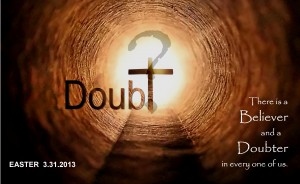 Within the body of Christ, an often unspoken, and at times, an emphatically spoken commandment is, “Thou shalt not doubt,” or, “God said it, just believe it, and that settles it.” Sad to say, this type of reaction to someone who is searching for answers to their questions about the truth claims of the Christian worldview, whether Christian or non-Christian, has turned many away from the truth of Christianity, and this reaction to a seeking individual happens all to often.
Within the body of Christ, an often unspoken, and at times, an emphatically spoken commandment is, “Thou shalt not doubt,” or, “God said it, just believe it, and that settles it.” Sad to say, this type of reaction to someone who is searching for answers to their questions about the truth claims of the Christian worldview, whether Christian or non-Christian, has turned many away from the truth of Christianity, and this reaction to a seeking individual happens all to often.
Let’s consider first, the dictionary definition for doubt:
to be uncertain about something;
be undecided in opinion or belief;
a feeling of uncertainty about the truth, reality, or nature of something.
Haven’t we all felt ‘uncertain’ or ‘undecided,’ even about the truth, reality or the nature of something? I know I have. However, it was this ‘uncertainty’ or doubt that drove me to investigate a particular truth claim and thus come to a conviction and belief that the truth claim was indeed true. This brought me to the place where I not only believed something to be true, but I knew why I believed it to be true. Or, if it was false, I would come to a knowledge and conviction that is was indeed false. When a doubt or an uncertainty about a particular aspect of my faith presents itself, I always try to first, take it to the Lord in prayer, asking Him to lead and guide me in my search for the truth, and then I dig in via the investigative process of meditating on the particular passage or truth claim, researching commentaries, books, etc., from trustworthy/notable theologians and scholars on that particular subject. I can say that in every case so far, my uncertainty/doubt has been alleviated and my faith has grown stronger. As Christian minister Lynn Anderson has said, “A faith that’s challenged by adversity or tough questions…is often a stronger faith in the end.”[1]
In the New Testament, the Greek word for doubt is Diakrinō which has several definitions:
- to separate, make a distinction, discriminate, to prefer
- to learn by discrimination, to try, decide
- to determine, give judgment, decide a dispute
- to withdraw from one, desert
- to separate one’s self in a hostile spirit, to oppose, strive with dispute, contend
- to be at variance with one’s self, hesitate, doubt
- Would I include examples of my cowardice when bravery was called for?
- Would I include the times I was disloyal, or betrayed the trust of my friends, and even loved ones?
- Would I include rebukes, along with the commendations, that I received from my boss, friends or loved ones?
- Would I include stupid things that I said at times, you know, those ‘foot in mouth’ moments?
- Tactics—Greg Koukl
- Conversational Evangelism—Norman Geisler
- Mere Apologetics—Alister E. McGrath
- On Guard—Defending Your Faith with Reason and Precision—William Lane Craig
- Christian Apologetics: A Comprehensive Case for Biblical Faith—Douglas Groothuis
- The Gospel in the Marketplace of Ideas—Paul Copan/Kenneth D. Litwak
- When God Goes to Starbucks—Paul Copan
- If God Made the Universe, Who Made God—130 Arguments for Christian Faith
-
I found it striking that the first and most common definitions were those with a particular focus on an investigative, discerning process–to separate, make a distinction, to prefer, to learn by discrimination, to try, decide, give judgement. As I mentioned above regarding my own experience with doubts, I have found that I can use them as a catalyst toward a stronger and robust faith via prayer, study and research. As Paul said, “test everything; hold fast what is good. (1 Thessalonians 5:21), which is a part of “loving God with all our mind.”
As Christians we are commanded to “always be ready to make a defense to anyone who asks you for a reason for the hope that is in you, yet do so with gentleness and respect.” (1 Peter 3:15) This means that we should not only be prepared to answer challenges to the Christian worldview from non-Christians, but we should also be ready/prepared to offer the same answers to a brother or sister in Christ who is struggling with doubts, whether they be intellectual or emotional, doing so with “gentleness and respect.” As Jude 1:22 commends us to, “have mercy on those who doubt.” Jesus’ own example is one that we can take to heart and apply here. As He came down the mountain, Jesus was met by a large crowd of people. A father had brought his demon-possessed son to Jesus’ disciples, but they were not able to cast the demon out. In desperation the father pleaded with Jesus, “If You can do anything, take pity on us and help us!” Jesus answered, “If You can! All things are possible to him who believes.” The father responded, “I do believe; help my unbelief.” Can you identify with the father in this story? I know I can. Oftentimes as Christians we find that our faith is in precisely the same state as this father’s. We genuinely believe, but we need help with our unbelief. It’s always been an encouragement to me that after the father’s admission of a faith mixed with doubt, Jesus nonetheless cast out the demon and healed the man’s son.
But the question is this–are we, each of us as individual Christians and members of the body of Christ, prepared and ready to be that ‘staff’ that others can lean on and come to in their hour of struggle with doubt? Are we prepared to meet the challenge of doubt, whether it comes from outside the church or from within? Charlie Campbell puts forth the following challenge to each of us:
“Can you imagine being an ambassador for your country and neglecting to prepare yourself for the common questions that people ask about your homeland? That would be irresponsible. You’d be without a job very quickly. God tells us that we are His ambassadors (2 Cor. 5:20). Seeing that that is the case, I think it is important that every Christian consider the following question: Am I ready to answer the common questions people ask about God? Am I ready to explain to someone why I believe the Bible is trustworthy? 1 Peter 3:15 says that we are to be ready to give a defense of our faith. Are you ready? Sadly, many Christians watch more TV in a week than they’ll spend in a year preparing themselves to answer questions about God and the Bible. Don’t leave defending the faith to your pastor. The church needs an army of saints who are able to articulate the truth persuasively and graciously. We are all called to “contend earnestly for the faith” (Jude 3).[2]
It is up to us, yes, each one of us, to equip ourselves as ambassadors for Christ and His Kingdom that we may lead others out of the dark valley of doubt, through love and compassion, and into the marvelous light of God’s truth–“I am the Way, the Truth and the Life.” (John 14:6)
How Can a Christian Deal with Doubt?–Os Guinness
Dealing with Doubts–William Lane Craig
Is it Ok to Question the Bible?
Resource:
Dealing with Doubt in Our Christian Faith
https://www.probe.org/dealing-with-doubt/
Footnote:
1 Lynn Anderson, interviewed in Lee Strobel, The Case for Faith, 322
In his classic masterpiece, The Screwtape Letters, C. S. Lewis brings to life an aspect of the Christian worldview which is even more applicable to today’s culture, than it was in Lewis’ day. Lewis wrote the Letters in 1941 with the goal of providing a series of lessons to the Christians of his day as to the importance of applying their Christian faith on a daily and active basis. In the Letters, Lewis portrays a typical human life, with all its temptations and failings, seen from two devils’ viewpoints, which makes it an illuminating expose on the spiritual warfare that all persons face. Whether Christian or non-Christian, we are all subject to the influences of the ‘dark-side.’
I am including here an illuminating excerpt from The Screwtape Letters, which I see as particularly applicable to the techno-immersed age in which we live. The role and influence that modern technology, via the internet, Smartphone, IPhone, Xbox, etc., plays in our lives should not be underestimated. (For more on this topic, here)
As we read, let’s keep in mind that this is a letter from the senior devil, Screwtape, to his nephew devil, Wormwood. When referring to the ‘Enemy’, Screwtape is referring to the personal God of the Bible. Here is the excerpt:
MY DEAR WORMWOOD,
I note what you say about guiding our patient’s reading and taking care that he sees a good deal of his materialist friend. But are you not being a trifle naïf? It sounds as if you supposed that argument was the way to keep him out of the Enemy’s clutches. That might have been so if he had lived a few centuries earlier. At that time the humans still knew pretty well when a thing was proved and when it was not; and if it was proved they really believed it. They still connected thinking with doing and were prepared to alter their way of life as the result of a chain of reasoning. But what with the weekly press and other such weapons we have largely altered that. Your man has been accustomed, ever since he was a boy, to have a dozen incompatible philosophies dancing about together inside his head. He doesn’t think of doctrines as primarily “true” or “false”, but as “academic” or “practical”, “outworn” or “contemporary”, “conventional” or “ruthless”…Don’t waste time trying to make him think that materialism is true! Make him think it is strong, or stark, or courageous—that it is the philosophy of the future. That’s the sort of thing he cares about.
The trouble about argument is that it moves the whole struggle onto the Enemy’s own ground. He can argue too; whereas in really practical propaganda of the kind I am suggesting He has been shown for centuries to be greatly the inferior of Our Father Below. By the very act of arguing, you awake the patient’s reason; and once it is awake, who can foresee the result? Even if a particular train of thought can be twisted so as to end in our favor, you will find that you have been strengthening in your patient the fatal habit of attending to universal issues and withdrawing his attention from the stream of immediate sense experiences. Your business is to fix his attention on the stream. Teach him to call it “real life” and don’t let him ask what he means by “real”.
After reading the above, a few questions come to mind:
Is my attention so fixed on the mind numbing ‘stream’ of sensual input I receive through my technology that I am no longer living ‘in the present,’ and as such, unaware of my immediate surroundings and the people around me? If so, I am either consciously or unconsciously allowing this input to alter my life in a detrimental way. Is this what I want?
Am I allowing my technology to control me? Am I being ‘taught what real life’ is through this steady ‘stream’ of input, so that I don’t even bother to question or ask what ‘real’ is or isn’t?
Have I grown accustomed to having a dozen incompatible, contradictory philosophies dancing about together inside my head? Could this be the result of not taking the time to pause and think, research and make an informed decision as to, ‘what is true and what is false?’ Do I even believe that there are ideas/worldviews that are actually true, and others that are false? In other words, do I believe that there is such a thing as objective truth?
Am I seeing only ‘with the eye,’ and not through the eye,’ as William Blake so aptly put it:
“This life’s dim windows of the soul
Distorts the heavens from pole to pole
And leads you to believe a lie
When you see with, not through, the eye.”

Malcolm Muggeridge states, “The media in general, and TV [and now the internet/IPhones] in particular, are incomparably the greatest single influence in our society. This influence is, in my opinion, largely exerted irresponsibly, arbitrarily, and without reference to any moral or intellectual, still less spiritual guidelines whatsoever.” As both these men have highlighted, it isn’t just the distraction aspect, or the time wasting aspect, or the antisocial effect that is at issue here—it is the worldview construct that is formed through the input received.
The apostle Paul gave the following instruction and warning of the spiritual warfare when addressing the church in Ephesus, “Finally, be strong in the Lord and in the strength of his might. Put on the whole armor of God, that you may be able to stand against the schemes of the devil. For we do not wrestle against flesh and blood, but against the rulers, against the authorities, against the cosmic powers over this present darkness, against the spiritual forces of evil in the heavenly places.” (Ephesians 6:10-12) As Christians, the foundation on which “we live and move and have our being,” is “the God who made the world and everything in it, being Lord of heaven and earth…who has fixed a day on which he will judge the world in righteousness by a man whom he has appointed; and of this he has given assurance to all by raising him from the dead.” (Acts 17:24, 31) The ‘man’ is none other than the God-man of the New Testament, Jesus of Nazareth. In the Gospel of John, John refers to Jesus as the Logos. In Greek philosophy the term ‘logos’ was an impersonal, but yet, rational ordering principle of the universe. The Logos is what made sense out of the universe. But John does not use Logos in just this way as he radically alters the use of the word while still maintaining some of the inherent meaning it would have for his readers. The Logos of John is personal and is not just an ordering principle as the Greek philosophers claimed. This personification of the Logos in Jesus of Nazareth is to all those who receive Him, “the Way, the Truth and the Life.” (John 14:6) Knowing the Source of all truth is vital if we are too successfully navigate the techno-obsessive, pluralistic, materialistic, and relativistic world in which we live. The Navigator is “actually not far from each one of us,” and waits for us to simply open our mind and heart to Him, the “Way, the Truth and the Life.” (Acts 17:27; John 14:6) He can start navigating your life right now via the following request:
“I come before you now, the personal God who created both the heavens and the earth, acknowledging my need for you, my Creator. I acknowledge you, Jesus, as the Way, the Truth and the Life, the one who came to this earth and paid the ransom for my sins through your death and resurrection. I turn to you now, Jesus, and ask for your forgiveness for my wrongdoing, and I invite you into my heart and life, that I may be transformed through your gift of eternal life that you have promised to all those who call upon and receive you. Illuminate my mind and open it to your truth so that I may understand and know you and the reason and purpose for my life. Thank you Jesus, for the gift of eternal life, and for revealing yourself to me.”—to all who received him, to those who believed in his name, he gave the right to become children of God…I stand at the door and knock. If anyone hears my voice and opens the door, I will come in to them.—John 1:12; Rev. 3:20
As Oxford mathematician and Christian apologist, John Lennox once said, “Christ accepted me unconditionally and I did the same.” Won’t you do the same?
 The credibility and veracity of the Gospel narratives has come under fire by opponents, critics and skeptics since the time that they were passed on via the oral tradition of the eyewitnesses, and later penned by these same eyewitnesses. As early as the second century, critics such as Celsus and Porphyry were putting pen to papyrus to discredit Christianity’s foundation doctrines, that of the incarnation, the historicity of the resurrection, etc.
The credibility and veracity of the Gospel narratives has come under fire by opponents, critics and skeptics since the time that they were passed on via the oral tradition of the eyewitnesses, and later penned by these same eyewitnesses. As early as the second century, critics such as Celsus and Porphyry were putting pen to papyrus to discredit Christianity’s foundation doctrines, that of the incarnation, the historicity of the resurrection, etc.
In this article I would like to cover the issue of honesty and transparency on the part of the Gospel writers, the eyewitnesses to Jesus life, death and resurrection, and put their character, the real ‘them’ under the ethical microscope to test their credibility and character, and as such, the veracity of their stories. After all, an historical biographical narrative, which is what the Gospels are , is only as accurate and true to life as the honesty and transparency of the person who writes it. But before I do that, I would like to pose the following reflective questions to ask ourselves:
If I were to write a biography of my life:
If you answered yes to each of these questions, then your biographical narrative would be considered honest and transparent, and as such, trustworthy, fulfilling the historical criteria of embarrassment. Gary Habermas and Michael Licona state that “embarrassing admissions support historical claims.” They define the criteria of embarrassment as: “An indicator that an event or saying is authentic occurs when the source would not be expected to create the story, because it embarrasses his cause and “weakens its position in arguments with opponents.” Law professor Annette Gordon-Reed states, “Declarations against interest are regarded as having a high degree of credibility because of the presumption that people do not make up lies in order to hurt themselves; they lie to help themselves.”
Here are a few examples taken from the Gospel narratives that answer each of the above questions:
Examples of cowardice when bravery was called for:
Mark 14:50 “Then everyone deserted him and fled.”
Matt 26:56 “Then all the disciples deserted him and fled.”
Matt. 26:69-75: “Peter was sitting outside in the courtyard. And a servant girl came up to him and said, “You also were with Jesus the Galilean.” But he denied it before them all, saying, “I do not know what you mean.” And when he went out to the entrance, another servant girl saw him, and she said to the bystanders, “This man was with Jesus of Nazareth.” And again he denied it with an oath: “I do not know the man.” After a little while the bystanders came up and said to Peter, “Certainly you too are one of them, for your accent betrays you.” Then he began to invoke a curse on himself and to swear, “I do not know the man.” And immediately the rooster crowed. And Peter remembered the saying of Jesus, “Before the rooster crows, you will deny me three times.” And he went out and wept bitterly.”
John 20:19 “On the evening of that first day of the week, when the disciples were together, with the doors locked for fear of the Jews…”
Examples of disloyalty, betrayal and trust of friends, and loved ones:
John 6:66—“After this many of his disciples turned back and no longer walked with him.”
Mark 3:20-21—“Then he went home, and the crowd gathered again, so that they could not even eat. And when his family heard it, they went out to seize him, for they were saying, “He is out of his mind.”
John 13:21-27—“After saying these things, Jesus was troubled in his spirit, and testified, “Truly, truly, I say to you, one of you will betray me.” The disciples looked at one another, uncertain of whom he spoke. One of his disciples, whom Jesus loved, was reclining at table at Jesus’ side, so Simon Peter motioned to him to ask Jesus of whom he was speaking. So that disciple, leaning back against Jesus, said to him, “Lord, who is it?” Jesus answered, “It is he to whom I will give this morsel of bread when I have dipped it.” So when he had dipped the morsel, he gave it to Judas, the son of Simon Iscariot. Then after he had taken the morsel, Satan entered into him. Jesus said to him, “What you are going to do, do quickly.”
Examples of rebukes, along with the commendations, that the disciples received from Jesus:
John 14:8-10—“Philip said to him, “Lord, show us the Father, and it is enough for us.” Jesus said to him, “Have I been with you so long, and you still do not know me, Philip? Whoever has seen me has seen the Father. How can you say, ‘Show us the Father’? Do you not believe that I am in the Father and the Father is in me? The words that I say to you I do not speak on my own authority, but the Father who dwells in me does his works.”
Matt. 16:15-19—“He said to them, “But who do you say that I am?” Simon Peter replied, “You are the Christ, the Son of the living God.” And Jesus answered him, “Blessed are you, Simon Bar-Jonah! For flesh and blood has not revealed this to you, but my Father who is in heaven. And I tell you, you are Peter, and on this rock I will build my church, and the gates of hell shall not prevail against it. I will give you the keys of the kingdom of heaven, and whatever you bind on earth shall be bound in heaven, and whatever you loose on earth shall be loosed in heaven.”
Examples of stupid things that the disciples said at times, those ‘foot in mouth’ moments:
Matt.17:1-6—“And after six days Jesus took with him Peter and James, and John his brother, and led them up a high mountain by themselves. And he was transfigured before them, and his face shone like the sun, and his clothes became white as light. And behold, there appeared to them Moses and Elijah, talking with him. And Peter said to Jesus, “Lord, it is good that we are here. If you wish, I will make three tents here, one for you and one for Moses and one for Elijah.” He was still speaking when, behold, a bright cloud overshadowed them, and a voice from the cloud said, “This is my beloved Son, with whom I am well pleased; listen to him.” When the disciples heard this, they fell on their faces and were terrified.”
Mark 8:31-33—“And he began to teach them that the Son of Man must suffer many things and be rejected by the elders and the chief priests and the scribes and be killed, and after three days rise again. And he said this plainly. And Peter took him aside and began to rebuke him. But turning and seeing his disciples, he rebuked Peter and said, “Get behind me, Satan! For you are not setting your mind on the things of God, but on the things of man.”
It is worth noting that a number of the above examples have to do with Peter. Peter is considered to be the ‘leader’ of Jesus’ disciples and therefore, a member of Jesus’ inner circle of disciples, along with James and John. As such, he would certainly be portrayed in the best possible light if the Gospel writers were biased in their accounts. However, nothing could be further from what has been recorded in the Gospel accounts! It is as though the writers, the eyewitnesses, went to great lengths to be as embarrassingly honest and transparent as possible. This once again highlights one of the historical criteria used to evaluate the veracity of an historical claim, the criteria of embarrassment.
 And we’ll finish here with yet one other embarrassing account that we find in Luke 24, that of the women being the first ones on the scene of the empty tomb. New Testament scholar, Richard Baukman states, “in the Greco-Roman world, educated men regarded women as, “gullible in religious matters, and especially prone to superstitious fantasy and excessive in religious practices.” Even though women had been excepted and prominent in Jesus’ ministry, the cultural hangovers were obviously still present. “Now it was Mary Magdalene and Joanna and Mary the mother of James and the other women with them who told these things to the apostles, but these words seemed to them an idle tales, and they did not believe them.” As to the authenticity of the Gospel accounts, it is unlikely that the Gospel writers would have made up a story of the men hiding in cowardice, while the women went boldly to the tomb. The early believers would have had no motive in humiliating its leaders by making them into cowards and the women into heroines.”
And we’ll finish here with yet one other embarrassing account that we find in Luke 24, that of the women being the first ones on the scene of the empty tomb. New Testament scholar, Richard Baukman states, “in the Greco-Roman world, educated men regarded women as, “gullible in religious matters, and especially prone to superstitious fantasy and excessive in religious practices.” Even though women had been excepted and prominent in Jesus’ ministry, the cultural hangovers were obviously still present. “Now it was Mary Magdalene and Joanna and Mary the mother of James and the other women with them who told these things to the apostles, but these words seemed to them an idle tales, and they did not believe them.” As to the authenticity of the Gospel accounts, it is unlikely that the Gospel writers would have made up a story of the men hiding in cowardice, while the women went boldly to the tomb. The early believers would have had no motive in humiliating its leaders by making them into cowards and the women into heroines.”
So were the authors of the Gospels honest and transparent in their accounts? I’ll let you be the judge. What we do know is that they passed the test of the criteria of embarrassment with flying colors worthy of an A+!
“There is no body of ancient literature in the world which enjoys such a wealth of good attestation as the New Testament.”—F. F. Bruce
“The apostles were for many reasons pre-eminent in whatever community they found themselves. They spoke with the authority which one who has seen and heard and handled always possesses.”—Rufus Jones
Sources:
Books:
Jesus and the Eyewitnesses–The Gospels as Eyewitness Testimony–Richard Bauckham–here
The Case for the Resurrection of Jesus–Gary Habermas & Michael Licona–here
New Testament–Too Embarrassing to Be False–Frank Turek
The dictionary definition of ‘nothing’ is as follows: not anything; no single thing; having no prospect of progress; something that is nonexistent; nonexistence. Now, having read the definition of nothing, (no thing) and applying it to the state of nothingness, what if I were to tell you that, ‘the universe created itself from nothing.’ Now before you start making plans to have me committed, let me clarify that it is not I who have made such a fallacious statement, but a few of the leading scientists of our day. You may be wondering, ‘how in the world, could a scientist make such a statement!?,’ and I would agree with you, how could they? The only way they could do so, and be convinced that the statement was an actual truth claim, is if they took it upon themselves to redefine what nothing, no-thing, nothingness is, and this is what they have done.
In March of 2013, some of the leading physicists and thinkers came together at the American Museum of Natural History to discuss what nothing, or no-thing is. Surprisingly, some of the greatest minds of our times could not come to a consensus as to what nothing actually is. The following is an excerpt from the news article that covered the highlights of the gathering:
“The simple idea of nothing, a concept that even toddlers can understand, proved surprisingly difficult for the scientists to pin down, with some of them questioning whether such a thing as nothing exists at all…During the debate, theoretical physicist Lawrence Krauss of Arizona State University, argued that there is a deeper kind of nothing which consists of no space at all, and no time, no particles, no fields, no laws of nature. “That to me is as close to nothing as you can get,” Krauss said. Philosopher, Jim Holt disagreed. “Is that really nothing?” he asked. “There’s no space and there’s no time. But what about physical laws, what about mathematical entities? What about consciousness? All the things that are non-spatial and non-temporal.” (Complete article here)
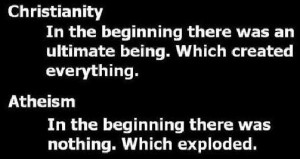 Lawrence Krauss (along with Stephen Hawking) has been at the promotional forefront of the redefining nothingness campaign, and has published a book, “A Universe from Nothing: Why There Is Something Rather than Nothing,” in an effort to propagate his theory. (The Afterward to the book is by none other than Richard Dawkins) Even though he, along with the other new atheists, have been painted into the naturalist/atheist corner via the confirmation of the ‘big bang’ (a finite beginning to the universe), they continue to come up with new theories, regardless of how fallacious they may sound, as to how and what was responsible for the beginning of the universe. The book by Krauss is just such an attempt, which he as a theoretical physicist should be the first to know, is an attempt to rewrite the laws of physics, the first one being—from nothing, nothing comes. But then again, there is ‘no new thing under the sun,’ and as such, this present day attempt to rewrite reality certainly harkens back to what Paul addressed in his day in his epistle to the church in Corinth, “who by their unrighteousness suppress the truth. For what can be known about God is plain to them, because God has shown it to them. For his invisible attributes, namely, his eternal power and divine nature, have been clearly perceived, ever since the creation of the world, in the things that have been made. So they are without excuse. For although they knew God, they did not honor him as God or give thanks to him, but they became futile in their thinking, and their foolish hearts were darkened. Claiming to be wise, they became fools, and exchanged the glory of the immortal God for images resembling mortal man and birds and animals and creeping things…” (Romans 1:18-23)
Lawrence Krauss (along with Stephen Hawking) has been at the promotional forefront of the redefining nothingness campaign, and has published a book, “A Universe from Nothing: Why There Is Something Rather than Nothing,” in an effort to propagate his theory. (The Afterward to the book is by none other than Richard Dawkins) Even though he, along with the other new atheists, have been painted into the naturalist/atheist corner via the confirmation of the ‘big bang’ (a finite beginning to the universe), they continue to come up with new theories, regardless of how fallacious they may sound, as to how and what was responsible for the beginning of the universe. The book by Krauss is just such an attempt, which he as a theoretical physicist should be the first to know, is an attempt to rewrite the laws of physics, the first one being—from nothing, nothing comes. But then again, there is ‘no new thing under the sun,’ and as such, this present day attempt to rewrite reality certainly harkens back to what Paul addressed in his day in his epistle to the church in Corinth, “who by their unrighteousness suppress the truth. For what can be known about God is plain to them, because God has shown it to them. For his invisible attributes, namely, his eternal power and divine nature, have been clearly perceived, ever since the creation of the world, in the things that have been made. So they are without excuse. For although they knew God, they did not honor him as God or give thanks to him, but they became futile in their thinking, and their foolish hearts were darkened. Claiming to be wise, they became fools, and exchanged the glory of the immortal God for images resembling mortal man and birds and animals and creeping things…” (Romans 1:18-23)
I am including the following resources from experts in the field, those who have dealt with, and put in context the ‘claims’ of Krauss, Hawking, and others. I hope that the following resources will be of help to you in “always being ready to give a defense” and “destroy[ing] arguments and every lofty opinion raised against the knowledge of God.” Being informed on this topic will add yet another tool to our apologists tool box, so we can help in teaching and informing others who may be taken in “by [this] philosophy and empty deceit, according to human tradition, according to the elemental spirits of the world, and not according to Christ…” (1 Peter 3:15; 2 Corinthians 10:5; Col. 2:8)
The New Nothingness: A Look at Lawrence Krauss’s A Universe from Nothing
By Dean C. Halverson–The Poached Egg–Ratio Christi’s Christian Worldview & Apologetics Network site, here
Lawrence Krauss writes that recent scientific discoveries show the universe could have come from nothing. He qualifies his definition of nothingness, though, to mean “empty space,” and then he fills that “empty space” with matter and antimatter ruled by the laws of quantum physics. So Krauss’s “nothing” is not really no thing, but is in fact something. Well into his book, Krauss addresses what came “before” the Big Bang. He proposes that a “more fundamental nothingness” is what came before the Big Bang, and he then applies several of God’s attributes— omnipotence, infinity, and necessity—to that “more fundamental nothingness.” It’s impossible, though, for a “more fundamental nothingness,” which has no being, to possess such attributes. Krauss himself raises the question as to where the laws of quantum physics could have resided before the Big Bang since “the more fundamental nothingness” is not sufficient to hold such ideas. By raising that question, Krauss inadvertently makes a case for the existence of a necessary Being that has a Mind in which such laws could have existed, thereby giving an apologetic for the God of the Bible. Since, after all is said and done, we cannot rise above that which is ultimate, Krauss’s view that ultimate reality is a nothingness eliminates all hope of our personal survival after death. Just as the universe came from nothing, as Krauss claims, so then in the end we will become nothing. Only the God who “has life in Himself” (John 5:26 NIV) can be a sufficient explanation for how the contingent universe came to be and is able to give us life. (For complete article, here)
Christian mathematician refutes atheist scientist on something coming from nothing
Debate between John Lennox and Peter Atkins–(Dr. Lennox soundly refutes Stephen Hawking’s following claim, “God is unnecessary,” and “there was no hand of God…the laws of physics can explain the universe without the need for a creator.“ See also Dr. Lennox’ lengthier refutation here)
Can The Universe Come From Nothing?–One Minute Apologist
William Lane Craig Q&A: Don’t Things Come From Nothing All the Time?
Print Resources:
Ex Nihilo, Nihil Fit (“Out of nothing, nothing comes”)–Mike Licona, article here
Creation Out of Nothing–Paul Copan & William Lane Craig–Baker Academic, 2004, book here
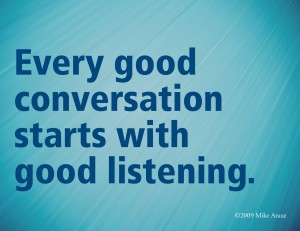 It has been said that, “everything begins with good listening,” and this conversational principle is essential if we are to bring the message of Christ to people in a way that is palatable, making it as attractive as possible so as to bring them to a serious consideration of choosing Christ as their own. We must, ‘seek first to understand, then to be understood,’ if we are to be an effective Christian case-maker.
It has been said that, “everything begins with good listening,” and this conversational principle is essential if we are to bring the message of Christ to people in a way that is palatable, making it as attractive as possible so as to bring them to a serious consideration of choosing Christ as their own. We must, ‘seek first to understand, then to be understood,’ if we are to be an effective Christian case-maker.
Norman Geisler put forth the following ‘formula’ that he has named, conversational evangelism:
“Conversational evangelism consists of four major kinds of conversations we want to have with our nonbelieving friends:
1. Hearing Conversations
2. Illumining Conversations
3. Uncovering Conversations
4. Building Conversations
…Each of these conversational types corresponds to the roles we need to play in our non-Christian friend’s lives: that of a musician, artist, archaeologist, and builder. As a musician, we want to listen more carefully and also we want to hear the sour notes people are singing to us. As an artist, we want to paint a picture using questions to help others see themselves in a true light. As an archaeologist, we want to dig up their history and find the real barriers that are chaining them down. As a builder, we want to build a bridge to the Gospel.”
In focusing on the ‘hearing conversations,’ and placing ourselves in the musician’s role, Dr. Geisler offers the following insight regarding the first step in pre-evangelism, a key component in successful Conversational Evangelism:
“Hearing is such an important step in pre-evangelism for three additional reasons. First, it helps us better connect with others. People feel appreciated when we understand their concerns and show patience in our dialogue with them. Second, it helps to put the other person at ease. If people sense you are genuinely trying to understand them, they may be less defensive and let down their guard to engage in honest dialogue. Third, as we develop good listening habits in our conversations with our non-believing friends, we may be able to identify some inconsistency in their beliefs that will then allow us to ask them just the right kind of question that would lead to further dialogue. This may also help to uncover the nature of their barriers to Christ, whether intellectual, emotional, or spiritual. The Bible reminds us of the importance of listening carefully, for “he who answers before listening—that is his folly and his shame.” (Proverbs 18:13)…our goal is to listen for clues to what our non-Christian friends really believe deep in their hearts.” (To order the book, Conversational Evangelism, here)
In her book, Why Do You Believe That?, Mary Jo Sharp places a strong emphasis on listening to others and the role listening plays in our defense of the gospel:
“Listening to the person right in front of you helps you to discover how to effectively serve that person. People we encounter are at different learning points in their own beliefs. Sometimes, a person has studied about their beliefs. Sometimes, a person barely knows their beliefs. When we assume a stereotype of a person’s beliefs, we might assume something that person either doesn’t know or doesn’t believe. If we ask questions about the individual’s beliefs, and try to understand their beliefs as they do, we can then pinpoint specific issues to discuss.
For example, I engaged in conversation with some folks at my door a few months ago. Instead of telling them what I thought they believed, I asked them, “Who is Jesus?” and “What is Jesus’ purpose?” They had a difficult time with answering these two questions. I realized my background in their religion wasn’t going to be very helpful with these specific folks. So I directed our conversation towards helping them figure out what they believed about Jesus. This was really important to ministering to these individuals. It wouldn’t have well served these two people for me to argue against beliefs they didn’t know or didn’t understand. My conversation with them was more productive because they had to discover and defend their own beliefs.
Listening is also vital in avoidance of creating straw men of other views. A straw man is a weaker version of a person’s argument, and it is an easier version to dismiss or knock down. However, creating a straw man of someone’s argument is not holding your self accountable to the truth. We need to truthfully represent others’ views as part of our witness of Jesus as the Truth. We should delight in the truth, even in the truthful representation of another’s beliefs. But we must listen with the intent to do so.” (Full article/interview here)
I will conclude here with a comment from Greg Pritchard which sums up the overall conceptual approach of Christian apologetics:
“Apologetics is explicitly and fundamentally Christian. Apologetics is a form of Christian love. We are called to love nonbelievers, and a part of how we are to love them is to share the life-changing message of the Gospel with them and explain why this message is true. Part of this love is caring about those who have not heard or understood the Gospel, or who disagree with the Gospel. We need to love them enough to listen to them, ask them questions, answer their questions, challenge them to be genuine seekers of the truth, urge them to examine the claims of Christ…” (Full article here)
First Steps In Christian Apologetics – Mary Jo Sharp
In his new book, Fool’s Talk: Recovering the Art of Christian Persuasion, Os Guinness states, “We are all apologists now, and we stand at the dawn of the grand age of human apologetics, or so some are saying because our wired world and our global era are a time when expressing, presenting, sharing, defending and selling ourselves have become a staple of everyday life for countless millions of people around the world, both Christians and others. The age of the Internet, it is said, is the age of the self and the selfie. The world is full of people full of themselves. In such an age, “I post, therefore I am.” For full article, here
 If you are like most people, you are in contact with a number of people each day, either in your workplace, school, university, Starbucks, or neighborhood, and you find yourself engaged in conversation on various levels. Usually the conversations are somewhat superficial, a bit about the weather, how the local sports teams fared last night, your plans for the weekend, etc., and of course there is nothing wrong in engaging in casual conversation as this is often what friends and colleagues do. However, if ‘casual’ is all there is to your conversations, then something is amiss, and that is this—you, as a Spirit filled Christian are not like most people, because unlike a person who doesn’t yet know the Lord and are yet to be filled with His Holy Spirit, you do know the Lord and are filled with His Spirit, and as such, you have “received power after the Holy Spirit has come upon you, and you will (are to be) my witnesses…to the end of the earth.” (Acts 1:8 ESV). (If you have not experienced the baptism of the Holy Spirit, please read Luke 11:13 and ask God to fill you with the Holy Spirit today.) And because you are different, in the sense that you are born again by the Spirit of God, (John 3) that sets you apart in a way that is unique within your surroundings.
If you are like most people, you are in contact with a number of people each day, either in your workplace, school, university, Starbucks, or neighborhood, and you find yourself engaged in conversation on various levels. Usually the conversations are somewhat superficial, a bit about the weather, how the local sports teams fared last night, your plans for the weekend, etc., and of course there is nothing wrong in engaging in casual conversation as this is often what friends and colleagues do. However, if ‘casual’ is all there is to your conversations, then something is amiss, and that is this—you, as a Spirit filled Christian are not like most people, because unlike a person who doesn’t yet know the Lord and are yet to be filled with His Holy Spirit, you do know the Lord and are filled with His Spirit, and as such, you have “received power after the Holy Spirit has come upon you, and you will (are to be) my witnesses…to the end of the earth.” (Acts 1:8 ESV). (If you have not experienced the baptism of the Holy Spirit, please read Luke 11:13 and ask God to fill you with the Holy Spirit today.) And because you are different, in the sense that you are born again by the Spirit of God, (John 3) that sets you apart in a way that is unique within your surroundings.
Let’s take a brief sampling of Jesus’ exposition on the relationship that his disciple is to have with the society or culture in which they reside. Remember, no person is an island, or ostrich for that matter. Now, taking the ‘ostrich’ as our example, let’s ask the question, ‘is there anywhere stated or even hinted at, either in the Gospels or the Epistles, a position or worldview that encourages or condones hiding, or treating ones’ surroundings with indifference, apathy or passivity?’ Unless you have a different Bible from mine, we have arrived at the same answer—No, there is no such position or worldview taught. So then, what does the NT teach as to the believers relationship with the world in which they live?
We need only look as far as the Sermon on the Mount to find the answer:
“You are the salt of the earth, but if salt has lost its taste, how shall its saltiness be restored? It is no longer good for anything except to be thrown out and trampled under people’s feet.
“You are the light of the world. A city set on a hill cannot be hidden. Nor do people light a lamp and put it under a basket, but on a stand, and it gives light to all in the house.
In the same way, let your light shine before others, so that they may see your good works and give glory to your Father who is in heaven. (Matthew 5:13-16 ESV)
The great evangelical luminary, John Stott, offers the following commentary on the above passages and how they inform the Christian worldview and the responsibility of each Christian who holds to what the NT affirms:
“To many of us, the verses of Matthew 5 are becoming increasingly familiar. We see their great importance today, and we begin to look at them again. In the Sermon on the Mount, Jesus proclaims, in verse 13: “You are the salt of the earth.” Verse 14: “You are the light of the world.” Verse 16: “Let your light so shine before men that they may see your good works and glorify your Father, which is in heaven.” (ERV).
In both these metaphors of the salt and the light, Jesus teaches about the responsibility of Christians in a non-Christian, or sub-Christian, or post-Christian society. He emphasizes the difference between Christians and non-Christians, between the church and the world, and he emphasizes the influences Christians ought to have on the non-Christian environment. The distinction between the two is clear. The world, he says, is like rotting meat. But you are to be the world’s salt. The world is like a dark night, but you are to be the world’s light. This is the fundamental difference between the Christian and the non-Christian, the church and the world.
By modest estimate, more than a quarter of the entire population of the United States have professed an evangelical conversion experience. William Iverson wryly observes that, “A pound of meat would surely be affected by a quarter pound of salt. If this is real Christianity, the ‘salt of the earth,’ where is the effect of which Jesus spoke?”
Then he goes on from the distinction to the influence. Like salt in putrefying meat, Christians are to hinder social decay. Like light in the prevailing darkness, Christians are to illumine society and show it a better way. It’s very important to grasp these two stages in the teaching of Jesus. Most Christians accept that there is a distinction between the Christian and the non-Christian, between the church and the world. God’s new society, the church, is as different from the old society as salt from rotting meat and as light from darkness.
But there are too many people who stop there; too many people whose whole preoccupation is with survival—that is, maintaining the distinction. The salt must retain its saltiness, they say. It must not become contaminated. The light must retain its brightness. It must not be smothered by the darkness. That is true. But that is merely survival. Salt and light are not just a bit different from their environment. They are to have a powerful influence on their environment. The salt is to be rubbed into the meat in order to stop the rot. The light is to shine into the darkness. It is to be set upon a lamp stand, and it is to give light to the environment. That is an influence on the environment quite different from mere survival.”[1]
 If we are to be the ‘salt and the light’ that we as professing Christians are called to be, we must be the influence that ‘salt and light’ have on their surroundings, which is a profound one and not a passive or nominal one. So how do we make the transition from survival to influence? Where do we start?
If we are to be the ‘salt and the light’ that we as professing Christians are called to be, we must be the influence that ‘salt and light’ have on their surroundings, which is a profound one and not a passive or nominal one. So how do we make the transition from survival to influence? Where do we start?
The first step is to identify the obstacles, or different ‘sands’ that may be standing in the way of getting our ‘head in the game,’ and then taking action in removing them. (The following is a brief summary of each of the obstacles to apologetic engagement which I’ll cover more fully in upcoming parts of this series.)
1. Simply unaware (aka clueless)—If you have not been aware of Christian apologetics, or have simply heard about it in passing but with no explanation as to what it is, and how it benefits the believer, both in their personal walk with the Lord, as well as equips them to be an effective, courageous, bold and ‘ready’ witness to others, I am not surprised. Sad to say, many churches, and youth leaders, have a certain bias against apologetics and as such, do not promote them within their congregations. I too went for years without such an awareness, and looking back from my current point of reference, the lack of this unmined wealth of evangelistic tools is a profound regret. I certainly would have been much more effective had the Holy Spirit had these apologetic tools to work with. But as Paul said, “…but one thing I do: forgetting what lies behind and straining forward to what lies ahead, I press on toward the goal for the prize of the upward call of God in Christ Jesus. (Philippians 3:13-14 ESV) So let’s get on with the race—no time to look back now, only to what is ahead.
2. Lack of confidence (aka lack of knowledge and humility) Christ’s ambassadors need the basic knowledge necessary for the task of being an apologist. They must know the central message of God’s kingdom and something about how to respond to the obstacles they’ll encounter on their diplomatic mission. We live in an era of history in which the “embarrassment of riches” are indeed embarrassing, or to put it another way, we have so much in the way of apologetic resources, that we are literally overwhelmed with the vast riches that will enable and prepare us to meet the intellectual and evangelistic challenges of our day. So why are we lacking in confidence in promoting the Christian worldview? Two reasons—lack of study time (aka hard work) and a lack of humility.
J. Warner Wallace is to the point in his assessment of this problem, “But if you want to be prepared to defend the truth, you’ll need to work hard and do whatever it takes to succeed. This may sound daunting, but I’m not asking you to do something you don’t already do. I bet there’s some aspect of your life where you are willing to invest time and energy for a much less important cause. How many hours a week do you spend catching up on our favorite television dramas? How much time do you spend watching sports, or reading about your favorite hobby? Few of us are so busy we have absolutely no time to spend studying what we believe about God. It’s really all a matter of priorities. Most of us are willing to spend time on the things that interest us most. Are our metaphysical beliefs about the existence of God important enough for us to invest the time necessary to become successful case makers? I’ve often described the impact of C. S. Lewis’ words when I first read the following: “Christianity is a statement which, if false, is of no importance, and, if true, is of infinite importance. The one thing it cannot be is moderately important.” (C.S. Lewis, from God in the Dock) Nothing could be truer. If Christianity is an accurate description of reality, it ought to inspire us to commit our time and effort. It ought to cause us to do whatever necessary to become the best Christian case makers possible.” (For full article, The Reason Why Few Christians Are Willing to Be Christian Case Makers, here)
3. Indifference—(aka ‘lukewarm’) Sad to say, there are too many Christians today who have not embraced Christ’s Great Commission ‘to go into all the world and preach the Gospel to every creature.’ (Mark 16:15; Matt. 28:18-20), and instead, are in a state of indifference which is nothing more than lukewarmness. This spiritual state is not something to be taken lightly. One only needs to turn to the letters to the churches in Revelation to hear the Lord’s word on this issue—“And to the angel of the church in Laodicea write: ‘The words of the Amen, the faithful and true witness, the beginning of God’s creation. “‘I know your works: you are neither cold nor hot. Would that you were either cold or hot! So, because you are lukewarm, and neither hot nor cold, I will spit you out of my mouth…I counsel you to buy from me gold refined by fire, so that you may be rich, and white garments so that you may clothe yourself and the shame of your nakedness may not be seen, and salve to anoint your eyes, so that you may see. Those whom I love, I reprove and discipline, so be zealous and repent. (Revelation 3:14-19 ESV) You can find no such lukewarmness in either Jesus or Paul’s teaching. Jesus said the following to all, (emphasis on ALL) “If anyone would come after me, let him deny himself and take up his cross daily and follow me. For whoever would save his life will lose it, but whoever loses his life for my sake will save it. For what does it profit a man if he gains the whole world and loses or forfeits himself? For whoever is ashamed of me and of my words, of him will the Son of Man be ashamed when he comes in his glory and the glory of the Father and of the holy angels…” (Luke 9:23-26 ESV) And Paul, “while…waiting for them at Athens, his spirit was provoked within him as he saw that the city was full of idols.” (Acts 17:16 ESV) What motivated Paul to address the people of Athens, both evangelistically and apologetically? In his own words, “for Christ’s love compels us…” (2 Cor. 5:14) If we really believe that, “for God so loved the world that he gave his only Son,” then we will go forth as Jesus and Paul went forth in being the ‘salt and light’ of the world via stirring ourselves up and shaking off the fog of indifference/lukewarmness.
4. Compromise (aka buying into religious pluralism) This particular obstacle, or ‘sand,’ is one that is so prevalent in today’s society that we are all effected by it in one way or another. Concisely put, societal pressure to compromise the uniqueness and truth of the Gospel message is rampant—as Jesus told us, “If you were of the world, the world would love you as its own; but because you are not of the world, but I chose you out of the world, therefore the world hates you. (John 15:19 ESV) This is a challenge that every witness/apologist for Christ will meet with on a regular basis. I’ll use a couple of examples here to make the point. In addressing religious pluralism and the Great Commission, author Greg Koukl states, “Any informed Christian can immediately see the challenge religious pluralism presents for the Great Commission, the authority of Scripture, the uniqueness of Christ, etc. Clearly, those who follow Jesus and understand the New Testament teaching on the work of the cross—and also for those who take the first of the Ten Commandments in its plain and obvious sense—cannot make peace with pluralism no matter how politically incorrect it is to oppose it.”[2]
5. Simple/childlike ‘faith’ (aka ‘the Bible says it, I believe it, that settles it’) I addressed this issue in the first part of this series, so I will offer only a very brief comment. This particular position would work well if Christianity was simply a personal worldview/belief, one that is experienced by the person and for the person. However, that is only one part of the Christian faith as Christ taught it. Within the Christian worldview there is an intrinsic thread that is woven throughout, and that is the responsibility of every Christian to proclaim the teachings of Christ to the world. It must be shown and shared with the world so what we as Christians know, will also be known by others. This is strongly connected to point #2—the only way to move from a simple, childlike and unreflective faith, is to bring our mind into the mix and do as Peter admonished, “…”preparing your minds for action…always being ready to make a defense to everyone who asks you to give an account for the hope that is in you, yet with gentleness and reverence…We are destroying speculations and every lofty thing raised up against the knowledge of God” (1 Peter 1:13; 1 Pet. 3:15; 2 Cor. 10:5) So you may be wondering, ‘where do I start in becoming a more effective witness for Christ?’ You can start with the following two points:
1. Pray—ask God to fill you with His Holy Spirit—if you have already received the baptism of the Holy Spirit, ask God for the ‘washing of regeneration, and the renewing of the Holy Spirit.’ (Titus 3:5)
2. Get your head ‘out of the sand’ and into the game—see point #2 above—study time is vital, there is no getting around it. One cannot ‘always be ready to give an answer to anyone who asks for the reason for the hope that is in you, doing so with gentleness and respect,’ if you do not know the reason(s) for the hope. (1 Peter 3:15) I would suggest that you begin with the following books, which if thoroughly studied, will equip any Spirit filled Christian with the essentials needed to be a Christian apologist, aka, a more effective witness for Christ.
(These books can all be found, either in the Store section of this site, or on Amazon.com)
 If we pray and yield ourselves to God’s will, loving Him with all our ‘heart, soul and mind,’ He will make us what He needs us to be, His ‘salt and light.’ (Rom. 12:1-2; Matt. 22:37) In so doing we will then be able to say with Martin Luther, “If I profess with the loudest voice and clearest exposition every portion of the truth of God except precisely that little point which the world and the devil are at that moment attacking, I am not confessing Christ, however boldly I may be professing Christ. Where the battle rages, there the loyalty of the soldier is proved, and to be steady on all the battlefield besides, is mere flight and disgrace if he flinches at that point.”
If we pray and yield ourselves to God’s will, loving Him with all our ‘heart, soul and mind,’ He will make us what He needs us to be, His ‘salt and light.’ (Rom. 12:1-2; Matt. 22:37) In so doing we will then be able to say with Martin Luther, “If I profess with the loudest voice and clearest exposition every portion of the truth of God except precisely that little point which the world and the devil are at that moment attacking, I am not confessing Christ, however boldly I may be professing Christ. Where the battle rages, there the loyalty of the soldier is proved, and to be steady on all the battlefield besides, is mere flight and disgrace if he flinches at that point.”
Part 1, here…Part 3, coming soon…God willing.
For more apologetic resources, here
Notes:
[1] John Stott, Four Ways Christians Can Influence the World, http://www.christianitytoday.com/ct/2011/october/saltlight.html?share=Rb%2bYxVxJD2BrGYJfuWppRbsl1A0JhLhO
[2] Greg Koukl, The Ambassador’s Guide to Pluralism, 2010, http://store.str.org/ProductDetails.asp?ProductCode=BK347
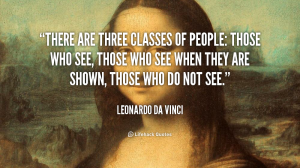 A large sector of the general public have been taken in by the Gnostic gospels ‘craze’, with Dan Brown’s fictional novel, The Da Vinci Code, leading the way. This is evidenced by the fact that the Da Vinci Code sold more than 40 million copies and was on the New York Times bestseller list for more than 50 weeks, not to mention the success of the movie that followed. The book has caused many to reexamine their concept of Christianity and to ask such questions as, “are the Gospel narratives, found in Matthew, Mark, Luke and John, all there is to know about Jesus, or is there something more?—maybe the gnostic ‘gospels’ are the real narratives of Jesus’ life, narratives that were suppressed by the early Church fathers, etc.” Human nature seems to lend itself to always be looking for that ‘something more,’ some hidden agenda or conspiracy that needs to be uncovered.
A large sector of the general public have been taken in by the Gnostic gospels ‘craze’, with Dan Brown’s fictional novel, The Da Vinci Code, leading the way. This is evidenced by the fact that the Da Vinci Code sold more than 40 million copies and was on the New York Times bestseller list for more than 50 weeks, not to mention the success of the movie that followed. The book has caused many to reexamine their concept of Christianity and to ask such questions as, “are the Gospel narratives, found in Matthew, Mark, Luke and John, all there is to know about Jesus, or is there something more?—maybe the gnostic ‘gospels’ are the real narratives of Jesus’ life, narratives that were suppressed by the early Church fathers, etc.” Human nature seems to lend itself to always be looking for that ‘something more,’ some hidden agenda or conspiracy that needs to be uncovered.
In his comprehensive article, The Gnostic Gospels: Are They Authentic?, Christian apologist, Douglas Groothuis puts the ‘excitement’ generated by the Nag Hammadi gnostic ‘gospel’ discoveries in context, “Although much excitement has been generated by the Nag Hammadi discoveries, not a little misunderstanding has been mixed with the enthusiasm. The overriding assumption of many is that the treatises unearthed in upper Egypt contained “lost books of the Bible” — of historical stature equal to or greater than the New Testament books. Much of this has been fueled by the titles of some of the documents themselves, particularly the so-called “Gnostic gospels”: the Gospel of Thomas, Gospel of Philip, Gospel of Mary, Gospel of the Egyptians, and the Gospel of Truth. The connotation of a “gospel” is that it presents the life of Jesus as a teacher, preacher, and healer — similar in style, if not content, to Matthew, Mark, Luke, and John. Yet, a reading of these “gospels” reveals an entirely different genre of material. For example, the introduction to the Gospel of Truth in The Nag Hammadi Library reads, “Despite its title, this work is not the sort found in the New Testament, since it does not offer a continuous narration of the deeds, teachings, passion, and resurrection of Jesus.” The introduction to the Gospel of Philip in the same volume says that although it has some similarities to a New Testament Gospel, it “is not a gospel like one of the New Testament gospels. . . . [The] few sayings and stories about Jesus…are not set in any kind of narrative framework like one of the New Testament gospels.”
 In his book, Fabricating Jesus, New Testament scholar, Craig E. Evans, explores modern historical study of the Gospels which seem to give us a new portrait of Jesus almost every Spring—conveniently timed for Easter so as to garner the most interest as well as getting the most monetary return for the effort put into the historical revisionism, whether it be literary or movie. The more unusual the portrait of Jesus is, spun from the imagination of the writer or producer, the more attention it receives from both the popular media and the uninformed and/or gullible public. It is understandable that the media and public would go for the new yearly ‘spin’ that is given to the life of Jesus of Nazareth, but for a chosen few within the scholarly community to also buy into the ‘spin’, it does cause one to wonder as to why, when the preponderance of the evidence speaks to the veracity of the New Testament narratives and against such Gnostic legends that appear in the middle of the second century. Chronologically speaking, this means that the Gnostic ‘gospels’ couldn’t have been written by eyewitnesses, nor would their authors have been able to directly interview eyewitnesses. The late dates of the ‘gospels’ call their authenticity into question. By the time these ‘gospels’ were penned, there was already widespread agreement among Christian leaders as to which writings they considered Scripture and those that didn’t pass the authenticity test. This was especially true concerning the Gospel accounts of Christ. Despite the claims of a hand full of scholars and sensationalistic critics, these Gnostic “gospels” weren’t considered by the earliest Christians as alternative or competing gospels for one simple reason—they didn’t exist yet. As C. S. Lewis observed when reading the New Testament Gospels, “I have been reading poems, romances, vision literature, legends and myths all my life. I know what they are like. I know none of them are like this,” however, legends and myths is exactly what we find in the Gnostic gospels.
In his book, Fabricating Jesus, New Testament scholar, Craig E. Evans, explores modern historical study of the Gospels which seem to give us a new portrait of Jesus almost every Spring—conveniently timed for Easter so as to garner the most interest as well as getting the most monetary return for the effort put into the historical revisionism, whether it be literary or movie. The more unusual the portrait of Jesus is, spun from the imagination of the writer or producer, the more attention it receives from both the popular media and the uninformed and/or gullible public. It is understandable that the media and public would go for the new yearly ‘spin’ that is given to the life of Jesus of Nazareth, but for a chosen few within the scholarly community to also buy into the ‘spin’, it does cause one to wonder as to why, when the preponderance of the evidence speaks to the veracity of the New Testament narratives and against such Gnostic legends that appear in the middle of the second century. Chronologically speaking, this means that the Gnostic ‘gospels’ couldn’t have been written by eyewitnesses, nor would their authors have been able to directly interview eyewitnesses. The late dates of the ‘gospels’ call their authenticity into question. By the time these ‘gospels’ were penned, there was already widespread agreement among Christian leaders as to which writings they considered Scripture and those that didn’t pass the authenticity test. This was especially true concerning the Gospel accounts of Christ. Despite the claims of a hand full of scholars and sensationalistic critics, these Gnostic “gospels” weren’t considered by the earliest Christians as alternative or competing gospels for one simple reason—they didn’t exist yet. As C. S. Lewis observed when reading the New Testament Gospels, “I have been reading poems, romances, vision literature, legends and myths all my life. I know what they are like. I know none of them are like this,” however, legends and myths is exactly what we find in the Gnostic gospels.
In his intro in the following video, Craig E. Evans states, “One of the reasons I wrote Fabricating Jesus, was this, I think, misuse in popular writing, but also even in some scholarly writing, the misuse of the Gospels, and suggesting that the NT Gospels really don’t give us what we need to know about Jesus. And so if we want to find what the real Jesus talked about we have to turn to these other sources. We have to look at the gospel of Thomas, for example, or the gospel of Peter or from some of the Gnostic writings, and then we will find the true Jesus. Sometimes in the popular writings, there’s the insinuation, if not explicit claim, that there’s a conspiracy of some sort, that the Vatican is behind something, that we don’t want the truth to get out, because it’s embarrassing, we don’t want people to know what Jesus was really like, he had a wife, for example, and children, or that he wasn’t divine at all, or that he was a this or he was a that, and on it goes ad nauseum. And so Fabricating Jesus, a major reason for writing, is to try to set the record straight, and say to the general public, ‘look folks, these claims about this mysterious Jesus, or the Jesus the Vatican doesn’t want you to know, is not based on any historical evidence, it’s not based on first century documentation, it’s not based on archeology, it’s not based on real scholarship.”
FABRICATING JESUS. FROM THE GNOSTIC GOSPELS TO THE DEAD SEA SCROLLS
Caricatures and Christ–by L. T. Jeyachandran
At the height of the craze, the Beatles boasted they were more popular than Jesus Christ. Earl Woods, father of the renowned golfer Tiger Woods, once noted that his son was more famous than Jesus Christ. Christians are piqued when such claims are made from time to time. I wonder if we should not marvel that this simple Galilean carpenter who lived two millennia ago should, without his asking, become the frame of reference for fame. The choice of theme for certain novels, purportedly hidden gospels, and other shock-invoking commentaries evince a similar interest in the person of Jesus Christ. For compete article, here
Why There’s No Such Thing as a “Lost Gospel”-by Lenny Esposito
Are there really “lost” Gospel texts that were eliminated from the Bible? The claim has been circulating for many decades now, with specials on television that highlight the Gospel of Judas or books such as Dan Brown’s The Da Vinci Code. Yet, simply because someone calls a writing “Gospel” does that mean it should be considered as a candidate for Scripture alongside Matthew, Mark, Luke, and John? I don’t think so. Complete article, here


